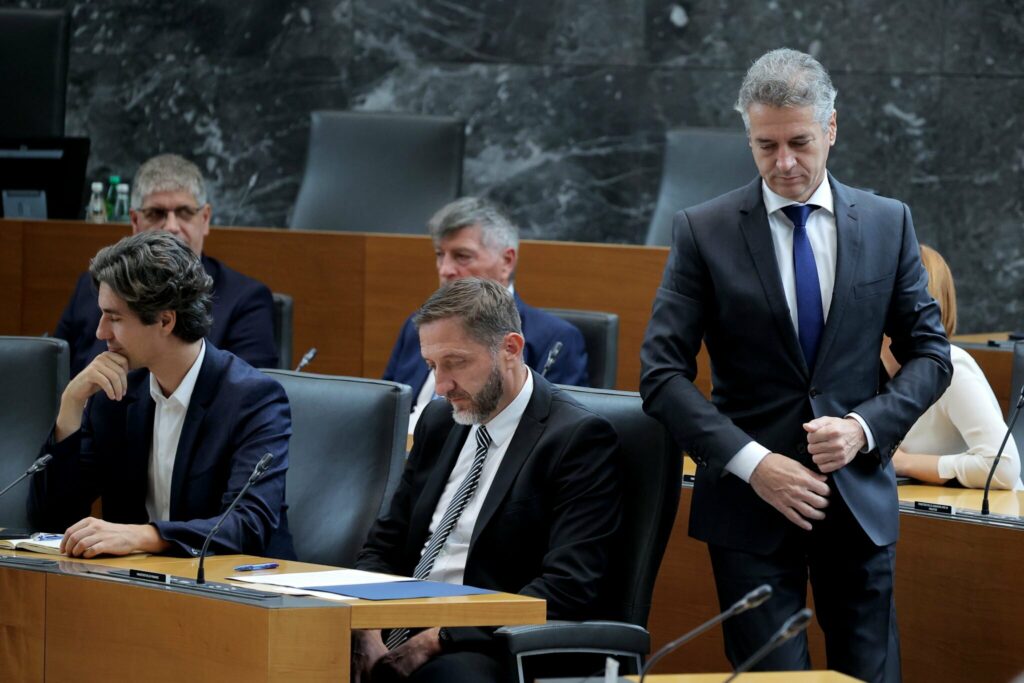As the wider Slovenian public began to realise that the reforms promised by the government of Robert Golob would not happen, dark clouds began to gather over the Prime Minister. Then came the August floods, which further exposed the inefficiency of the government team and then the resignations of three ministers. We spoke to political analyst Miran Videtič to find out whether the government’s days are numbered. He believes that Golob will not throw in the towel just yet, firstly for personal reasons and also because of his character. But that does not mean that the government team will not undergo further major changes.
Robert Golob‘s government currently has the lowest public opinion poll support ever. Last December, they recorded over 34% support; today, it is only 18.8%. “In fact, we are repeating old, familiar patterns of media-inflated new faces. Despite them being very loved by the Slovenian electorate, expectations quickly turn out to be too high, and, of course, this love quickly cools down. I am worried that the number of undecided voters is growing, which means that a group is re-forming that still believes in the new faces, but not in the existing offer,” explains Miran Videtič.
Asked whether the government of Robert Golob can still pick itself up after a sharp drop in popularity, he says: “I think this government has been operationally dead for some time now. This government is a bunch of individualists with vested interests who have so far shown no zeal to work for the public good. Can it rise? It can, if it fundamentally changes its actions and shows the people results, and not just promises, ever-postponing timetables and the like. I am thinking here, in particular, of healthcare, and of course, this post-flood reconstruction is also one of the priorities. On the other hand, it seems to me that the coalition itself no longer believes in each other.”
Videtič also points out that in upcoming days we will see how the Left party (Levica) will tighten up in the foreign policy area “and I think that this (the conflict in Israel) has come in handy for them, because the Left party will be looking for a way out of the government, because now it is no longer just the Freedom Movement (Gibanje Svoboda) that is going down, but also the Social Democrats (Socialni demokrati – SD) and the Left party.”
Who will bring down the government?
We then discussed the strategy that the political left will henceforth adopt in the wake of the terrible results of the opinion polls with Videtič. “Absolutely, the political backgrounds that make up the left governments work primarily on the experience of public opinion. What has already happened to some before, is now happening to Golob, and there will probably now be a “red alert” for those networks or “designers” that something new will have to be found. I do not think, however, that at this moment, given the experience of the Šarex government, they would go to destroy the existence of the coalition. If anyone is going to tear it down, I think it will be the Left party,” he says.
When asked how long the government will last, he says: “I will not speculate, as I said I am sceptical, especially about the Left party. But I think there will be a radical change in names soon.” Asked if he thinks that the government’s personnel reshuffle is over yet, he says: “Far from it”.
Videtič believes that Golob will persevere for two simple reasons: “One is his personal interests, and the other is that it is difficult for people of his character to admit defeat”. He does not think that he will do what Marjan Šarec did before him – meaning, he will not back down. “By doing so, he may prolong his own agony,” he says.
The naive Prime Minister
Finally, we talked to Videtič about the changed tone of media coverage. The dominant media, traditionally loyal to the transitional left, have raised difficult issues for this government, mainly related to corruption scandals. “This is Prime Minister Golob’s main problem. He is convinced that he controls the media, probably because of the misinformation he receives from his closest advisers. Those of us who are a little more involved in political issues know that the media are mainly in the hands of people who are neither on the ballot nor elected at the moment. And here lies his basic problem, because he naively believed that when there was a drop in support for him, the media would not react against him,” he concludes.
Ž. K.


